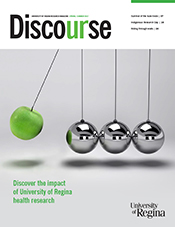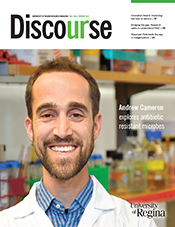
Imagine having a persistent cough that produces such a thick mucous that it feels like drowning from the inside.
Imagine being short of breath all the time.
Imagine frequent lung infections, often leading to bouts of pneumonia.
These are common symptoms of Cystic Fibrosis (CF) – an incurable disease that affects one in every 3,600 children born in Canada.
Recent funding from Cystic Fibrosis Canada to researchers across the country is hoping to make a difference in these symptoms.
Dr. Omar El-Halfawy, Canada Research Chair in Chemogenomics and Antimicrobial Research and an assistant professor of chemistry and biochemistry at the University of Regina, is one of the researchers who received support.
“The chronic lung infections that CF patients suffer from is one of the top causes of their declining health and death,” says El-Halfawy. “My team addresses two research funding priorities identified by CF Canada. The first is to eradicate chronic Pseudomonas aeruginosa infections. The second priority will be to help improve airway infection treatment.”
He explains that a bacterium called Pseudomonas aeruginosa is the most common bug in these infections. Another called Burkholderia cenocepacia is less common, but leads to worse outcomes.
“The devastating effects of chronic infections that people with CF have prompted my research team to take a unique approach to studying these pathogens,” says El-Halfawy who has studied CF pathogens throughout his research training, at both the doctoral and postdoctoral stages.
“Excessive phlegm in CF lungs – which is called sputum – provides nutrients and a platform for microbes to thrive and cause infections,” says El-Halfawy. “But we usually study how microbes respond to antibiotics in the lab, which doesn’t mimic the conditions present in CF lungs. This, then, excludes conditions that could be key to understanding how microbes behave during infection.”

Because test conditions matter and influence how research results can lead to impacts and breakthroughs in patients’ lives, El-Halfawy and his research team will do something different.
Using artificial CF sputum and mixing them with Burkholderia cenocepacia, the researchers will study how Pseudomonas responds to different antibiotics under conditions resembling those at a CF lung infection site.
“Then, using genomics, an advanced approach that probes all genes in a microbe, we will work to uncover the antibiotic-response factors Pseudomonas uses during a CF lung infection that leads to antibiotic resistance and contributes to therapeutic failures in CF patients.”
El-Halfawy says understanding these factors may serve as targets for drug discovery of new antimicrobial therapeutics active against Pseudomonas.
El-Halfawy says that some of his team’s research findings from this project will be of immediate use – such as how to optimize the use of antibiotics already available on the market for CF patient symptoms.
“Through rapid large-scale drug discovery efforts, this project will discover and identify the mechanism of promising drug candidates capable of combating Pseudomonas, reversing antibiotic resistance under CF conditions,” says El-Halfawy. “Our drug discovery efforts use previously approved FDA drugs, which may lead to their rapid deployment into the clinic for CF patients. We’re hopeful that this project will provide promising new and urgently needed antimicrobial drug candidates for CF chronic Pseudomonas aeruginosa infections.”
This will lead to the team’s second priority.
“When we reveal how Pseudomonas’ responds to different potencies of antibiotics in CF lung infection-like conditions, whether due to growth in artificial CF sputum or interaction with another CF microbe, our research may help optimize the clinical use of available antibiotics, improving the treatment outcomes of CF airway infections.”
El-Halfawy says that some of his team’s research findings from this project will be of immediate use – such as how to optimize the use of antibiotics already available on the market for CF patient symptoms.
“Because we’re testing the effects of previously approved drugs, this will help expedite repurposing FDA-approved drugs for CF therapy. Of course, using drugs in patients for such new purpose will take time beyond the timeframe of this first grant, but we will know if there are any promising solutions within the next three years, and that’s exciting for us, and possibly life-changing for those who live with CF,” says El-Halfawy.

















